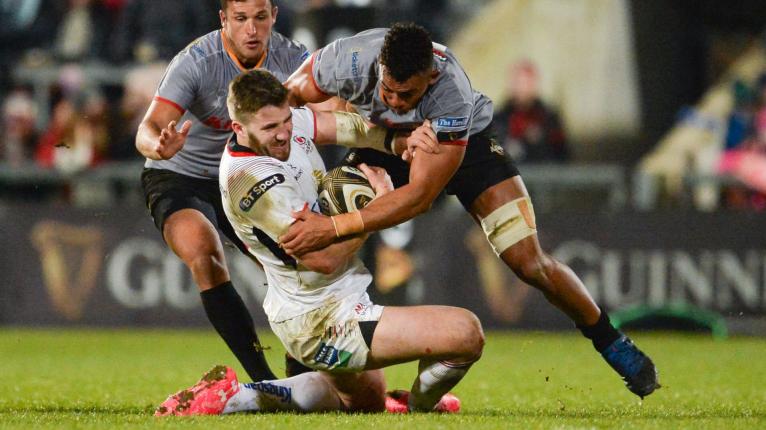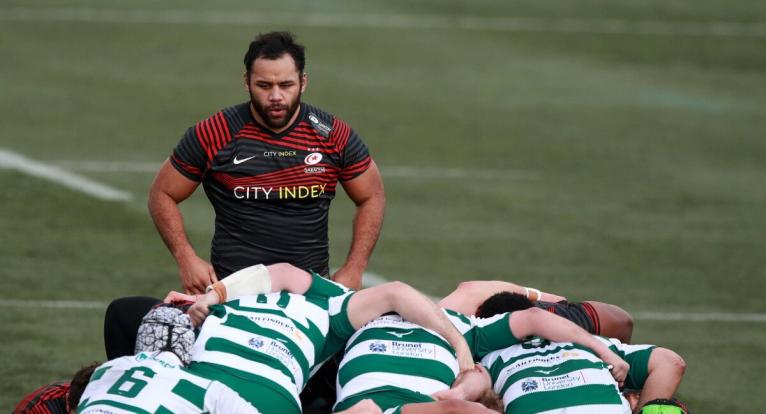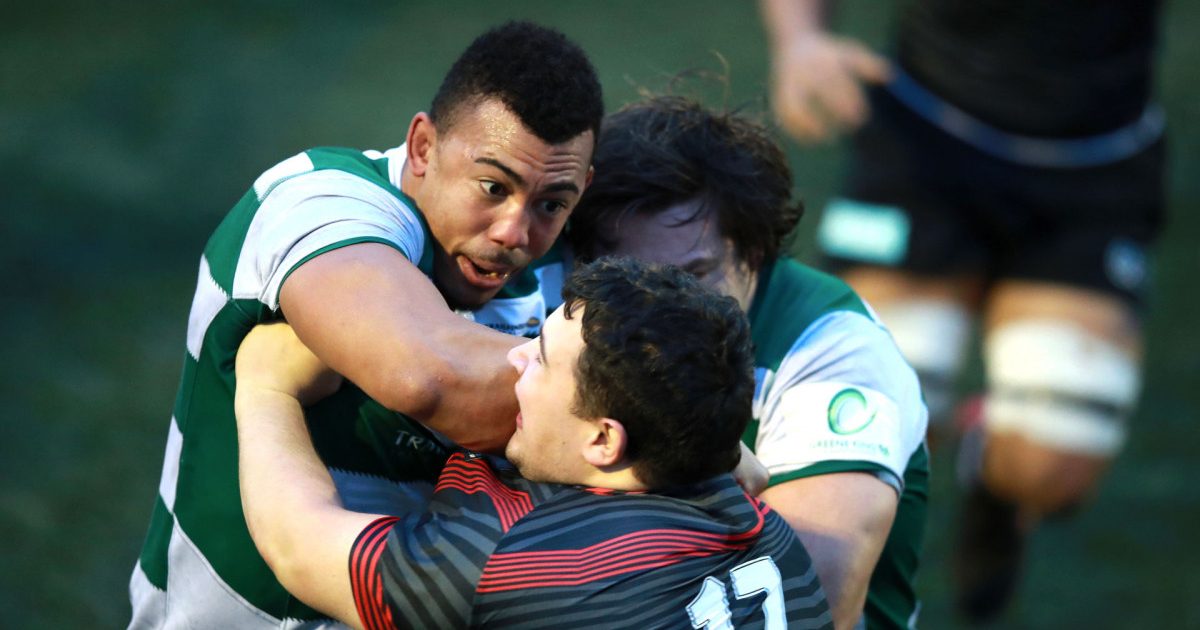'They felt it would be best to amputate my leg' - Bobby de Wee and the 'shark attack'

Bobby de Wee likes to tell people that the vivid scar running from his left hip to his knee is the legacy of a childhood shark attack. For a solid five minutes, he regaled his new Ealing team-mates with stories of the seagoing beast that took a chunk out of his leg.
Eventually, the ruse collapsed and de Wee melted into the impish smile and booming guffaws that pepper his dialogue.
This immeasurably tall tale is a source of laughter now, but concealed beneath the mirth lurks profound trauma. At fourteen years old, de Wee lay in a South African hospital listening to doctors tell him that his leg would be amputated. A bacterial infection was snaking through the limb, poisoning tissue, devouring flesh and rotting the boy from the inside.
For any teenager – let alone one hell-bent on making it in professional rugby – the sheer paralysing terror of this prognosis is impossible to imagine. And all the more unfathomable that the infection was contracted in a schoolboy match from a particularly arid spot of sun-blistered pitch.
“After the game, I had a grass burn, and it felt like I had a bit of a dead leg,” the lock tells RugbyPass. “This continued for about three days. I told my mum and dad, went to the doctor, and he said it was just a rugby injury that would be fine if I rubbed some ointment on it.
“Eventually I went in for a sonar and they saw that I had staphylococcus, a type of flesh-eating bacteria, in my system. Because it was on my left side, where the heart is, it had a gangrene-like effect where it spread throughout my body. They felt it would be best to amputate my leg.
“They told my father it was best to just go in and operate, and if we were in there beyond a certain amount of time, my father would know that they’d had to amputate. The doctor managed to save my leg, albeit I have a very long scar, and I was bed-ridden for three months or so. I lost a lot of muscle mass, I had to learn to walk again, and it brought my family very close.”
The horror never dimmed de Wee’s thirst to play. Indeed, it had precisely the opposite effect.
“My dad asked if I still wanted to play rugby. I said to him, ‘It’s Grant Khomo week next year’. He took me through a vigorous training programme, and I ended up making the Grant Khomo team.
“I’d say a bit of the fire was ignited: you know what, I can actually make a career out of this. Subsequently, Heyneke Meyer drafted me to the Bulls up in the Pretoria. That’s where it all started for me.”
De Wee’s life has been riddled with distressing episodes. At 13, his parents divorced. A year later came the scourge of staphylococcus, and by the time he was 20, the Bulls had cast him into the wilderness. He missed a vast swathe of rugby after seriously damaging his shoulder, then last September, his dear Southern Kings went bust and plunged the contract-less squad into a state of panic.
Growing up in Klerksdorp, a town of tough industry and tougher people, de Wee learned to smithereen the obstacles in his midst.
“We aren’t one of the wealthiest families; we can’t compare to the high rollers of this world,” he says. “But my parents always did everything in their power to make sure if we needed or wanted something, that if we work hard, we can have it.
“One of the biggest driving forces to make it rugby is to give them financial security. I don’t want to use the words ‘if it’s in our budget’ to my future children, I want them to understand that if you work for something, you will achieve it.
“I’ve been able to say to my dad, ‘Here’s some money for you to do this project, or finish that building’. My parents know that if they are in a bit of financial trouble, they can come to me and I can help them, and they can send my brother to varsity.”

While de Wee saved wisely, the coffers have run barren in Port Elizabeth. The demise of the Kings brought a grim end to a franchise that had operated in ramshackle fashion for years. It also dealt a hammer-blow to the region that consistently produces wonderful talent, particularly from its large black community.
The Kings team had few of the resources that professional clubs take for granted. They were repeatedly and inevitably stripped of their foremost players. The turmoil brought the squad fiercely close.
“Something that resonates in all the players that I’ve encountered at the Kings is that we’re all hungry for success,” de Wee says. “A lot of the guys came from a bigger union where they maybe didn’t get the exposure or game time and are hungry to prove themselves.
“When all that happened, the rug pulled from under your feet, a lot of them started stressing. The timing just sucked. A bunch of us had said no to contracts at other clubs, who had then done all their recruitment and spent their budgets.
Blessed, Grateful, Highly Favored and Forever Thankful ??? pic.twitter.com/DMid3IFjW1
— BdW (@bobby_d_4) January 15, 2021
“I had said no to Edinburgh, because I always said that I didn’t see the Kings as a stepping stone, I wanted to play 100 games for them. I always felt we had tremendous potential to become a powerhouse and I wanted to be at the forefront when it all happened. I’ll take losing for two or three years if it means I see my name up in lights someday as the player who stuck through it all.”
That dream was never fulfilled, but perhaps de Wee can still forge a slice of rugby history. The Trailfinders are hugely ambitious, astutely run and lusting to win promotion to the Premiership.
De Wee arrived in England in mid-December, self-isolated, and spent Christmas alone in his flat. His mother wept down the phone when he called home during the festivities. He used his enforced solitude to mediate and think deeply about how he had neglected life beyond the ‘rugby bubble’. He reached out to jilted old girlfriends and began seriously contemplating life after retirement. When he got down to business, he was staggered by what he found.
“Having known what Ealing’s ambitions were, I saw a lot of the Kings in them when I previously joined them. I saw an opportunity like that and I took it.
Something about watching this #SuperRugbyUnlocked that just makes me aaaaaaaaaaaah! ???
CANT WAIT TO GET STUCK IN AGAIN!!!
Craving contact with everything in me!!— BdW (@bobby_d_4) October 17, 2020
“I was super impressed when I arrived. I knew I’d signed for a Championship team, and to my own detriment, I arrived with my eyes a bit big. I thought, jeez, these guys have a 4G pitch. The gym – you really want to get me excited, take me to your gym – I saw in there they had branded benches, they had GPS systems, a nutritionist, everything. I have never experienced this.
“These guys are serious. We started training and it was a shock to me, the level these guys train at. I said to my friends back in South Africa, just based on the way Ealing are training, they would give a couple of teams in South Africa a good hiding.
'Ever since then the club backed me and I backed the club. Loyalty swings both ways.'
2 try @ealingtfrugby hero Alun Walker was thrust into the rugby limelight after his performance against Sarries & rumours soon followed for the Scot.
w/ @heagneyl ???https://t.co/BWY25cD417
— RugbyPass (@RugbyPass) January 24, 2021
“And to be honest, I couldn’t keep up with them. I am usually someone who prides himself on his fitness, and we had done a kicking drill, I looked to side and the prop Kyle White was running in front of me. Flipping hell, is this the level I’m at right now?!”
Ten months had passed since de Wee’s last game when he rumbled out at Trailfinders Sports Club and helped Ealing claim the scalp of Saracens, a result that resonated across English rugby.
It may not have been a wartime league tussle, and Mark McCall may not have fielded all of his rock stars, but the contest felt like a significant moment and de Wee played all 80 minutes of it.
Facing Billy Vunipola and Vincent Koch, he found the drive to keep grinding, keep bludgeoning in the throes of exhaustion.
“I can’t even keep up with the guys in training and you are throwing me into the deep end, not against a semi-pro team, but against Saracens,” he says. “I just felt like a deer in headlights.
“But I told myself, when I’m down, and I feel like stopping, I’m just going to remember everything that I’ve been through to get here.

“It went relatively well. Obviously, I made a couple of mistakes, but I felt that it wasn’t too bad a game for my first after ten months. Not exactly where I want to be, but a lot better than I hoped I would go. And it’s difficult not to enjoy the game based on the brand of rugby that Ealing play.”
Beyond the obvious quest for promotion, there is a greater purpose to de Wee’s toil. He yearns to succeed for personal fulfilment and to shape a better life for his parents, but he also wants to leave a lasting footprint back home.
'My @LboroRugby coach said he'd just had Wasps on the phone, they're keen to sign me, am I interested? At the end of the call, I just put the phone down and screamed'@JLyall93 ??? talks to @Thibaud_Flament who went the long way round landing his dream https://t.co/OtFRau81Rs
— RugbyPass (@RugbyPass) January 24, 2021
“For a coloured boy, there were no rugby players who made it from Klerksdorp, so there wasn’t someone I looked up to,” de Wee says.
“I saw that as an opportunity to be the first guy, I can give hope to another Bobby that could be dreaming of playing professionally but because no-one else has done it he can’t believe that he can do it.
“I might not be an Eben Etzebeth or a Beast Mtawarira, but I want to live out my talents so that some kid watching me knows that it’s possible for him to do the same.”
Role model, raconteur, staphylococcus survivor – Bobby de Wee bears the scars of his trying past, but in the here and now, he has made himself a vibrant inspiration.














































